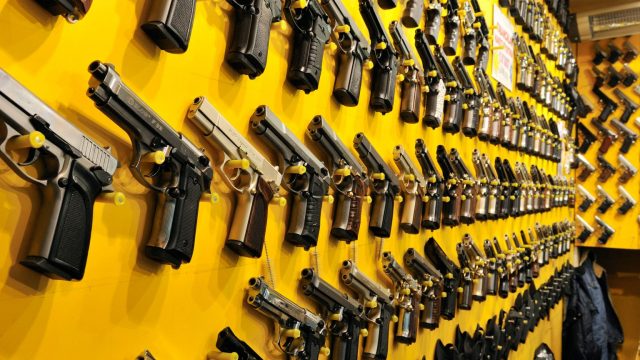Three Weeks After Oregon Shooting American Support For Gun Rights Increases

“Given the proof that the cops are not quick enough to stop a shooting in progress to save every [life], then it’s important to protect one’s own life with any means possible,” writes Ace of this news:
Nearly three weeks after the latest mass shooting claimed the lives of nine people, 52% of Americans now oppose stricter gun control laws, 6% more than the 46% of Americans who support such laws. That’s a wider gap than in June when CNN last surveyed Americans on gun control, finding that the public was equally split at 49% on the issue.
The advantage of those opposed to stricter gun control laws over those in favor is outside of the poll’s 3-point margin of error.
In related news, John Lott has an excellent column in National Review today pointing out the dangers of gun free zones. He notes that there’s evidence that shooters really do target them. “Since at least 1950, all but two public mass shootings in America have taken place where general citizens are banned from carrying guns,” he writes, but the evidence goes beyond that:
Mass killers have even explicitly talked about their desire to attack gun-free zones. The Charleston, S.C., church shooting in June was instead almost a college shooting. But that killer changed his plans after realizing that the College of Charleston had armed guards.
The diary of the “Dark Knight” movie-theater killer, James Holmes, was finally released just a few months ago. Holmes decided not to attack an airport because of what he described in his diary as its “substantial security.” Out of seven theaters showing the Batman movie premiere within 20 minutes of the suspect’s apartment, only one theater banned permitted concealed handguns. That’s the one he attacked.
Or take two cases from last year. Elliot Rodger, who fatally shot three people in Santa Barbara, Calif., explained his reasoning in his 141-page “manifesto.” He ruled out various targets because he worried that someone with a gun would stop his killing spree. Justin Bourque shot to death three people in Canada. On Facebook, Bourque posted a picture of a defenseless victim explaining to killers that guns are prohibited.
Also, mass shootings are not an uniquely American phenomena as the proponents of gun control claim. ““[W]e as a country will have to reckon with the fact that this type of mass violence does not happen in other advanced countries,” President Barack Obama said after the Charlestown shooting. “It doesn’t happen in other places with this kind of frequency.”
But it does, actually. If we put the death rate from mass public shootings in the context of overall population, America isn’t at the top of the global list:
Even if we look at frequency – the number of mass shooting attacks per 1 million people – America still isn’t at the top of the list:
Even if we measure by severity, America isn’t the worst place for shootings in the world. “The CPRC has also collected data on the worst mass public shootings, those cases where at least 15 peoplewere killed in the attack,” reports the Crime Prevention Research Center. “There were 13 cases where at least 15 people were killed. Out of those cases, four were in the United States, two in Germany and two in the United Kingdom. But the U.S. has a population four times greater than Germany’s and five times the U.K.’s, so on a per-capita basis the U.S. ranks low in comparison — actually, those two countries would have had a frequency of attacks 1.96 (Germany) and 2.46 (UK) times higher.”
I don’t think I need to tell you that places like Germany, the UK, and Norway all have gun control laws far stricter than America’s to one degree or another.
If we want to address mass shootings, trying to squeeze access to guns isn’t likely to be successful even if it were politically possible which it probably isn’t. Rather, we should look at addressing why people engage in mass shootings (I suspect in recent years of intense media coverage there is a lot of copy catting going on) and also look at removing vulnerable targets like “gun free zones.”
In fact, it’s probably time we started looking at “gun free zones” as what they really are. A target on the back of everyone in the “zone.”






